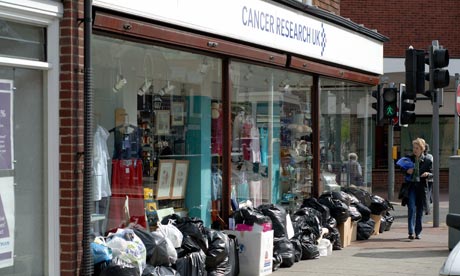
UK charities are renowned for their innovation and, during recent years of economic instability where many fundraising methods suffered while the value of second-hand textiles soared, many fundraisers invested time and energy in house-to-house collections of unwanted clothing. They were quick to recognise the income potential but, sadly, so too were criminals who have targeted charity collections with theft and fraud.
It is staggering to think that, in this country, we throw away 2m tonnes of clothing and textiles waste each year. In fact, it is the fastest growing type of waste. Of this, as much as 1.2m tonnes ends up in landfill. Charity collections are a fantastic way of not only reducing waste and preserving our environment, but of generating vital funding. Second-hand textiles are valued at more than £600 per tonne, a price that has reportedly doubled over the past few years. Whether collected goods are passed on for resale at charity shops, sold overseas or recycled, they can generate substantial profits for the sector, now raising millions each year.
But, as charity collections increased, they soon became the target for criminal activity. It is not a case of someone nicking a few bags from the street, but mass crime. It is the work of organised criminals, costing the sector an estimated £15m each year.
Some gangs are stealing bags of goods intended for charities, others are running fraudulent collections themselves, claiming that donated goods will go to charities, legitimate or otherwise. In south Wales earlier this year, two people were charged with stealing as many as 50,000 charity bags of clothing left out on residents' doorsteps. Countrywide, reports have filtered in about bogus collections and bag theft.
Charity bag crime has cost the sector dearly both in terms of lost income and public mistrust. It has escalated to such a level that it is of great concern to charities, commercial collectors, police, government ministers and, of course, the public. Many charity supporters are understandably nervous about donating goods to charities in this way. This threat to public confidence is very real.
Over the past year, public complaints to us at the Fundraising Standards Board about bogus goods collections have increased by 100% as supporters query suspicious collections and express their confusion about which collections are legitimate. We monitor complaints received by our member charities and those reported by the public about non-members. Over the past quarter, one-fifth of all non-member complaints were about bogus collections.
When supporters are worried, fundraisers are even more worried. The impact of a loss of confidence in such an important fundraising method is significant and we need to do everything we can to re-establish trust, helping supporters distinguish between bogus and legitimate collections. Charity bag collections are a vital income generator for so many charities and, with the additional benefits of saving unecessary waste that would otherwise be headed for landfill, is an area of fundraising we must all fight to protect.
In January 2011, the minister for civil society, Nick Hurd, held a round-table meeting involving representatives from the textile recycling industry, charities, regulatory bodies and police to address the issue of bogus textile collections. The National Fraud Intelligence Bureau is in the process of setting up a new charity fraud desk, staffed by force analysts and industry volunteers to draw together and analyse crime intelligence and co-ordinate a national law enforcement response. New guidance is under way for trading standards officers and there is considerable guidance for supporters about bogus collections. But what can charities do about it?
Now more than ever before, it is crucial that any charities involved in this type of collection follows best practice as set out in the Institute of Fundraising's code of practice on house-to-house collections. We need to show supporters that it is still safe to give to charity in this way. Further guidance is available from the institute about how to help your supporters distinguish real from bogus collections.
Alistair McLean is chief executive of the Fundraising Standards Board. Further information and intelligence about bag crime will be presented at a Clothing Collections Symposium, co-hosted by The Fundraising Standards Board and Institute of Fundraising on September 14 2011 in central London. For further information, visit our website or email policy@institute-of-fundraising.org.uk.
This content is brought to you by Guardian Professional. To join the voluntary sector network, click here.







